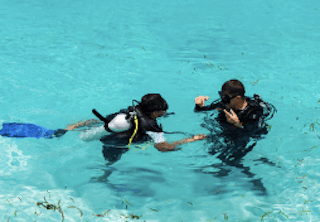Last Updated on October 21, 2021 by Dan
Certifications are essential for scuba diving. They determine how deep you can go, what type of gear you can use, and other safety protocols that must be followed to dive safely. Certifications expire every five years so it’s important to stay up-to-date on your certifications throughout the year.
Certification requirements vary depending on where you’re diving in the world but there are only four internationally recognized certification agencies: PADI, NAUI, SSI, and IDA. These four organizations offer a variety of courses from beginner level to professional levels respectively with various certification options within each course for an individual looking to get certified. PADI is one of the most well-known agencies.
What are scuba diving certifications?
Scuba certifications are designed to help someone learn how to use scuba equipment properly and dive safely. They range from basic open water certification down to nitrox-level training for deep divers, so it’s important that you know which one is right for your needs before starting!
PADI open water certification
The PADI open water certification is the most popular scuba diving certification. To get your PADI Open Water Certificate, you need to complete 4 training sessions and pass an exam. You can choose from different types of dives (surface-supplied air, nitrox, or compressed air). If you are looking for more advanced certifications, there are many options available, such as rescue diver or divemaster. Scuba diving is a great way to explore the ocean while staying safe!
The reduction in scuba diving certifications due to COVID in 2020.
With the most sought-after dive professionals in all the world, PADI Dive Centers have readied their operations to resume diving responsibly and reduce COVID risk while still giving health a priority. Though no business can guarantee zero risk from this disease, implementing policies such as those below will help you manage it more effectively:
1) Provide staff training on how best to deal with infected divers;
2) Implement rigorous infection control procedures including handwashing before handling them or any other surfaces they may have touched around water (or GRE permits if applicable), wearing full protection against transmission by respiratory droplets when possible but at minimum use barrier equipment like masks & gowns whenever exposure is unavoidable.
3 ) Vaccinate personnel that has already been symptom-free for at least 30 days.
Recommendations and requirements for dive operations are set by local authorities.
- Ensure that you adhere to your local government’s social distance restrictions, medical mask guidelines, and other recommendations and criteria set forth by your authorities.
- Check with your local business bureau or a different advising body for company-related guidelines and other resources to assist you in participating in business while complying with COVID-19 safety precautions.
- Respecting social distances is important. This might imply limiting the number of passengers. Take note of the wind’s effects and that passengers prefer to avoid the sun or be in it, depending on the weather. Having all aboard wearing medical masks may decrease risk. 11 May 2020 v1
- Provide hand sanitizer for passengers in case of an emergency.
- If you can, position your equipment before boarding so that divers may prepare their gear, and masks and snorkels are kept in a dive bag until needed. (The goal is to reduce the chance of accidental contact transmission)
- Extend the path if necessary to allow for delays while leaving.
- For masks and other gear, we recommend that you don’t use rinse buckets.
- Encourage divers to be more conservative.
Outdoor Activities Without International Travel
As the pandemic has subsided, people are looking for ways to get out of their homes. Do in part by a recovering economy and increased interest from international divers who want access but can’t travel abroad due to border closures or restrictions on foreign visitors into America’s borders; inland scuba diving appears as an attractive option that provides them with this opportunity while remaining safe within U-S territory! Domestic tourism also did better than international trips during 2020: Americans spent more money travelling domestically than overseas, which could be partly attributed because many were just seeking relaxation after recent stressful events like natural disasters happenings around our country such as hurricanes, no matter where you live here on the mainland.
Core Divers Will Be More Active in 2021
In the Sports & Fitness Industry Association’s study on scuba diving in 2021, we see a decrease in casual divers (those who go scuba diving once a year during a vacation) but an increase in scuba diving participation among core divers. This report will be presented in detail in the 2021 Scuba Diving Participation Rate.
The bottom line is that scuba diving certification requirements vary depending on where you’re diving in the world. However, there are only four internationally recognized certifications agencies to choose from which offer a variety of courses for beginner and professional level divers respectively with various price points. These organizations also represent safety standards all around the globe so it’s important to stay up-to-date on your certifications throughout the year if you want to dive safely offshore or inland anywhere in the world!

